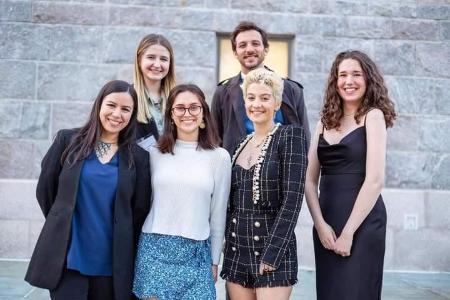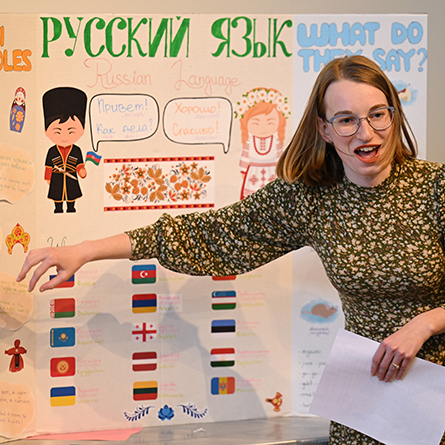
French is spoken by 320 million people on five continents, including Europe, Africa, and North America, and is on track to be the world’s 2nd most spoken language by 2050. In the French and Francophone Department, students French learn the language while acquiring knowledge in the fields of literature, cinema, history, and the Francophone world, all while honing their critical-thinking skills. The small class sizes and attentive, excellent faculty help students advance quickly toward their linguistic, intellectual, and professional goals. Extra help with conversation is provided through French language tables, French tutors, and a Fulbright Fellow coming directly from France. An annual French film festival, invited speakers, and other events sponsored by the department throughout the year complement a vital Francophone cultural and intellectual life on campus.

Professors Sana Abdi & Jacob Lévi with outstanding French and Francophone Majors at the Honors & Awards Ceremony.
With a strong basis in grammar, culture, and conversation gained from French classes, majors and other students in French study abroad in a French-speaking country (France, Morocco, Cameroon…), and often complete international internships.
After graduation, students with French have a leg up for graduate school, law school, or the professional world, where they are often recruited thanks to their language skills and cultural knowledge.
French classes at the beginning and intermediate levels focus on language acquisition in speaking, understanding, reading and writing, while progressively introducing more content (cinema, literature, etc.) as students move up in level. Advanced classes are informed by the French and Francophone analytical traditions in philosophy, postcolonial theory, literary analysis, and cinema that have been influential throughout humanities and social science departments in colleges and universities, including in Sociology, Comparative Literature, English, Film Studies, Religion, and Psychology.
Many French courses are co-offered with other academic departments, including anthropology, film studies, global Islamic studies, and gender, sexuality, and intersectionality studies, offering students an unusually wide range of opportunities to explore a topic, issue or problem using the conceptual framework and tools of more than one academic discipline.
Students can also combine a French major with another major such as International Relations, Economics, Dance, English, or Government, or with one of the College’s interdisciplinary certificate programs; the CISLA certificate program is particularly popular among French majors.
